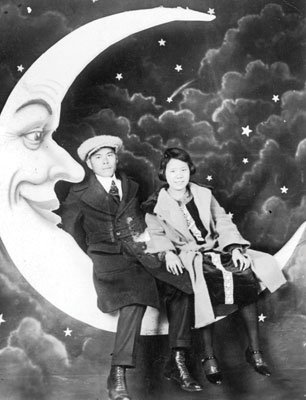I was the only Caucasian in the room as 100 pairs of
Japanese-American eyes watched if I would try sushi. I had never
tasted Japanese food and never touched a chopstick, but I was
determined to not let it show. I would not be the only one to ask
for a fork! I was attending a special dinner being given to honor
my future husband’s Aunt Helen on her 80th birthday, and the family
had rented an entire Japanese restaurant. It was also my
introduction to those who would become my new Japanese-American
family.
I was the only Caucasian in the room as 100 pairs of Japanese-American eyes watched if I would try sushi. I had never tasted Japanese food and never touched a chopstick, but I was determined to not let it show. I would not be the only one to ask for a fork! I was attending a special dinner being given to honor my future husband’s Aunt Helen on her 80th birthday, and the family had rented an entire Japanese restaurant. It was also my introduction to those who would become my new Japanese-American family.
I picked up the chopsticks and stabbed an unidentifiable exotic-looking rice-coated object circled by what looked like little orange sugar crystals. Somehow the food made it to my mouth. The subtlest murmur rippled through the crowd. Then I tried something that looked like a little football – a flavored rice in a tan-colored sack. It was delicious.
“She’s eating it! She’s eating it!” someone whispered.
I tried every dish, none of it recognizable to me. It was only a few days later that I found out I had eaten the entire meal holding my chopsticks upside down! It seemed to me that I could get more food in my mouth with the bigger end of the sticks. Actually, the narrow end is sharper and more ready to grasp food.
In the 19 years since that day, I have been won over by Japanese food, and my life has been immeasurably enriched by becoming part of this Japanese-American family. I have come to know a culture and customs of which I was completely ignorant, and people who are unfailingly kind, hard-working, humorous, never bitter and always inclusive. I have never felt like an outsider, and as soon as I joined the Teraji family, my parents were also embraced and included in every Japanese family wedding, funeral, anniversary and birthday.
One of the most memorable meals I shared with my adopted family was the celebration of my husband’s grandfather reaching his 100th birthday. Everyone gathered to honor the family patriarch, whom we all affectionately knew as Jichan – or grandfather – Teraji. He is also known as Eizo in Japanese and Frank in English.
Born in 1894 in Wakayama, Japan, Jichan became one of the South County’s first lettuce farmers in the early 1920s. He married his bride in 1923, always known as Bachan – or grandmother – to us, but known as Toshizu in Japanese and Mary in English. She came here as what was then known as a “picture bride,” which was similar to being a mail order bride. She was 18. He was 29.
During the course of their successful marriage in which they enjoyed farming and raising their four children, the family received word from friends in 1942 that the FBI was coming to round them up and incarcerate them at the Salinas Rodeo Grounds. They would be sent to internment camps.
Jichan quickly woke everyone up, fleeing in the night with all the belongings they could carry in their truck and escaping to Colorado. During the war, their Caucasian neighbors took care of their property. Their two sons served in the armed forces. The family farmed in Colorado for the duration of the war, and when it was over, they returned home.
“It was the happiest day of my life,” said my father-in-law, Henry – or Hideo, as he is also known.
When I met Jichan and Bachan, we could not communicate verbally, but we got along well using a series of hand motions and facial expressions. Every time they saw me, they smiled huge smiles, patted me on the head, and gave me at least $20 in cold hard cash. And food. They never visited without bringing almond cookies, fresh fruit, sushi, or mouth-watering teriaki chicken – or all of the above. My family celebrated their 70th wedding anniversary with them and 200 of our closest Japanese-American relatives with (what else!) another big family meal.
To get your own taste of the local Japanese cuisine and culture that I have so enjoyed, check out the Autumn Sake and Sushi Tasting event Sunday. The Local History of Our Japanese Community Committee is sponsoring the event in order to fund upgrades to their displays of the Japanese-American history of Morgan Hill, San Martin, Coyote Valley and Gilroy. They work to document and preserve this largely unrecorded local history, as well as to share it with schools, civic organizations, and other interested groups. There will also be a display of South County Japanese-American history.
Organizers will put on a discussion on the making of sake, a raffle and a silent auction of Japanese artifacts. The event will feature sushi, sake and other Japanese delectables from local restaurants.
Sushi and Sake fest
When: 2 to 5 p.m. Sunday
Where: Morgan Hill Buddhist Community Center, 16450 Murphy Ave., Morgan Hill
Tickets: $25 at BookSmart, 80 E. 2nd Street, Morgan Hill; $30 at door














